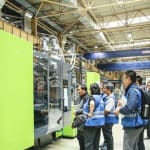 Where is the Chinese automotive market heading? What further challenges does electromobility present? And where are new opportunities opening up for automotive suppliers in Asia? - These and other questions were discussed by the more than 300 participants at the two-day automotive conference trend.scaut 2018, which injection moulding machine manufacturer and systems expert Engel hosted in Shanghai at the end of October.
Where is the Chinese automotive market heading? What further challenges does electromobility present? And where are new opportunities opening up for automotive suppliers in Asia? - These and other questions were discussed by the more than 300 participants at the two-day automotive conference trend.scaut 2018, which injection moulding machine manufacturer and systems expert Engel hosted in Shanghai at the end of October.For the first time, Engel trend.scaut took place parallel to FUMOTec, the international trade fair for automotive engineering and future mobility, at the Shanghai World Expo Exhibition & Convention Centre, thus attracting a particularly high level of attention to the conference. "Some trade fair visitors who had not known Engel and trend.scaut before spontaneously registered," reports Gero Willmeroth, President East Asia and Oceania of Engel based in Shanghai. The participants were mainly development and production managers as well as managing directors of both Chinese and international companies,and this also contributed to the huge success of the event. "We discussed new technologies and opportunities for the future on the basis of the specific requirements of local producers and were also able to reflect the topics in an international context." The key-note program was top-class with speakers in-cluding representatives of Volvo and Nobo (a member of the Great Wall Motor Company), Continental and Ecorea, as well as JSC Automotive, ExxonMobil, Sabic and Engel.
As the first presentations already made clear, the automotive market in Asia is continuing to develop at a particularly dynamic pace. "Over 100 vehicle brands are now competing in China," says Dr Norbert Müller, head of the Engel Center for Lightweight Composite Technologies, explaining the situation. The focus is on electric vehicles. Another development is that renowned Chinese suppliers are also placing their products in the premium segment. "This results in important opportunities for the market entry of new technologies," says Müller, summarising both trends and using the example of innovative composite technologies in his presentation. Together with his team, Müller develops new, particularly cost-effective processes for large-scale composite lightweight construction, covering a broad range of technologies: from HP-RTM and SMC to the processing of thermoplastic semi-finished products such as organic sheets and tapes, through to innovative reactive technologies such as in-situ polymerisation (T-RTM). "What is new is that composite manufacturers in Asia are also increasingly focusing on thermoplastic-based solutions," says Müller. "The possibility of functionalising thermoplastic composite materials immediately after moulding in the same mould using injection moulding can secure decisive time advantages."
Focus on productivity and efficiency
The fact that high productivity and efficiency in the automotive industry are more decisive for competitiveness and success than in other sectors is not a new insight. In Asia in particular, however, the situation could be further aggravated, at the latest by 2020, when subsidies for electric vehicles are discontinued. In the key-notes and in the panel discussion, but also in smaller meetings on the sidelines, this topic came up time and time again. Various future scenarios were developed, but there is no general agreement among the experts. According to Jochen Siebert, the managing director of JSC Automotive, a management consultancy specialising in the Chinese automotive market, the industry is already undergoing a transformation process that could slow down the dynamic market development and lead to consolidation. Another scenario is that hybrid vehicles are growing faster than electric vehicles.Process integration and automation are becoming even more important as efficiency pressure increases. "We are increasingly supplying multi-component machines to Asia," confirms Michael Fischer, Head of Business Development Technologies at Engel's headquarters in Austria. Engel is increasingly developing integrated system solutions including process technology, automation and other peripherals for the automotive lighting and interior sectors. "If we precisely coordinate all process stages and match system components right from the start, we can exploit both the efficiency and quality potential to the full," says Fischer.




